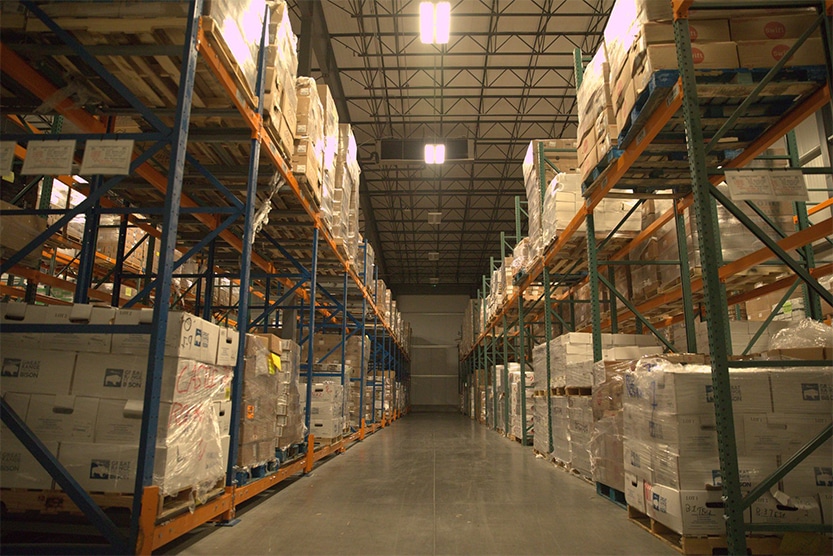Frozen Storage vs. Refrigerated Storage: What’s Best for Your Business in Denver?

Selecting the right type of storage for your temperature-sensitive inventory in Denver directly impacts your product integrity, compliance, and overall supply chain performance. At Mile Hi Express, we understand how critical it is to align your storage solution with the unique needs of your business. Whether you’re storing frozen meats, fresh produce, dairy, or pharmaceuticals, choosing between frozen and refrigerated storage isn’t just a logistical decision—it’s a strategic one.
Understanding the Core Differences Frozen Storage vs. Refrigerated Storage
The primary difference between frozen and refrigerated storage is temperature range. Frozen storage typically maintains temperatures at or below 0°F (-18°C), making it suitable for long-term preservation. Refrigerated storage, on the other hand, operates between 33°F and 41°F (0.5°C to 5°C), ideal for products that require cooling without freezing. This difference influences everything from shelf life to compliance with FDA food safety guidelines.
Which Businesses Need Frozen Storage?
Frozen storage is essential for industries where product preservation over extended periods is critical. Examples include:
- Meat and poultry processors
- Ice cream manufacturers
- Frozen meal distributors
- Cold chain pharmaceutical logistics
These businesses rely on sub-zero environments to prevent spoilage, eliminate microbial growth, and maintain quality throughout the supply chain.
Industries That Rely on Refrigerated Storage
Businesses dealing with perishable but not frozen products require refrigerated storage. Common use cases include:
- Fresh fruit and vegetable distributors
- Dairy suppliers (milk, cheese, yogurt)
- Bakeries with cream-filled goods
- Floral wholesalers
These products degrade quickly at room temperature, but refrigeration slows deterioration without compromising texture or composition.
Denver-Specific Storage Challenges
Denver’s high elevation and wide temperature swings present additional hurdles for temperature-controlled logistics. At 5,280 feet above sea level, the boiling point is lower, which can affect food processing. Fluctuating outdoor temperatures can strain equipment if not properly monitored. At Mile Hi Express, we mitigate these risks using insulated storage units, continuous digital temperature tracking, and backup power systems.
Compliance Matters: Stay Audit-Ready
Both frozen and refrigerated storage facilities must comply with FSMA (Food Safety Modernization Act) and FDA guidelines. Mile Hi Express exceeds regulatory requirements with features like:
- Continuous temperature logging
- Equipment redundancy (backup generators, compressors)
- Clean, pest-controlled environments
Our clients pass audits without costly delays or surprises.
Cost Comparison: Frozen vs. Refrigerated
Frozen storage is generally more expensive due to the increased energy consumption and insulation requirements. On average:
- Frozen storage costs 30-40% more than refrigerated storage
- Equipment maintenance is higher for freezers due to frost buildup
However, storing bulk items long-term in frozen environments may ultimately reduce spoilage and shrinkage, offsetting the initial expense.
Inventory Turnover: What Makes Sense for Your Operation?
Refrigerated storage is ideal for businesses with high inventory turnover. For example, a Denver-based farm-to-table produce supplier benefits more from a 40°F facility than a freezer, as the product is delivered and restocked daily. On the other hand, frozen storage supports low-turnover, long-shelf-life items like frozen entrees, bulk poultry, or COVID-19 vaccines.
Shelf Life Comparison
| Product Type | Room Temp Shelf Life | Refrigerated Shelf Life | Frozen Shelf Life |
| Milk | 6-8 hours | 7-10 days | Not applicable |
| Raw Chicken | 2-3 hours | 1-2 days | Up to 12 months |
| Fresh Strawberries | 4-6 hours | 3-7 days | 6-8 months (frozen) |
| Ice Cream | Melts quickly | Not storable | 1-2 years |
How Mile Hi Express Supports Your Choice
No matter your decision, Mile Hi Express provides scalable cold chain solutions tailored to your operational goals. Our services include:
- LTL Delivery Services: Ideal for businesses that need small quantities delivered frequently without managing a full truckload.
- Cross Docking: Minimize storage costs by transferring goods directly between inbound and outbound trucks.
- Refrigerated Frozen Storage: Our high-tech warehouse maintains exact temperatures with round-the-clock monitoring.
- Inventory Management: Our team tracks your product by SKU, temperature requirement, and expiration date.
Choosing Based on Product Risk Level
Products with a high risk of contamination, such as seafood or raw meat, require stricter temperature control. Frozen storage drastically reduces bacterial growth, while refrigerated environments slow but do not eliminate it. Understanding your product’s hazard level helps guide your storage choice.
Customer Testimonials: Real Results in Denver
“We switched to Mile Hi Express for frozen LTL distribution across Colorado and saw a 22% drop in returns due to spoilage. The daily updates and appointment logs are unmatched.” — Local Denver Seafood Wholesaler
“Our dairy operation relies on fast refrigerated turnarounds, and Mile Hi Express has consistently delivered on time with product intact. Highly recommend.” — Regional Dairy Brand
Mile Hi Express is your go-to partner in Denver for LTL delivery, cross docking, frozen and refrigerated storage, and expert inventory management. Whether you’re scaling your food service operation, shipping temperature-sensitive pharmaceuticals, or distributing retail grocery products, Contact us today at 303-296-8465 to discover how we have the infrastructure and experience to protect your product and your reputation.
